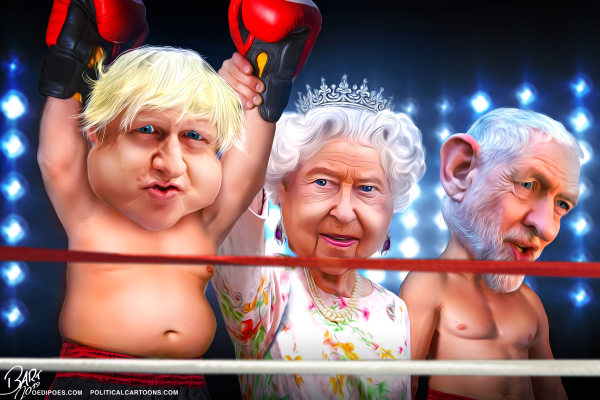
Is Boris Johnson’s major victory in the UK and the-to-many shocking big defeat of UK’s left a harbinger of what will happen in the United States in 2020?
In recent months, I’ve gotten a sinking feeling about what I read and hear about many assuming that Donald Trump’s shattering of norms, testing and in some cases ignoring laws, defiance of Congress’ role and legitimacy as a separate powerful branch of government, etc. will naturally mean in the end voters would boot him out on his covfefe in 2020. It’s starting to feel as if an perilous political bubble has devoured some folks.
Martin Longman, one of my favorite commentators, raises the issue on his must-read website Progress Pond. Here’s a good chunk of it with my own take:
The real problem is the failure of the Democrats to understand that a polarization of the electorate based on race would disadvantage the party representing minorities and that a serious effort needed to be launched to prevent Trump from growing his strength in his strongholds. I wrote about this on November 10, 2016 and in a June 2017 feature article for the Washington Monthly, and everything I feared has come to pass. Even as Trump has hemorrhaged support in the nation’s suburbs, he has more than made up for it by growing his support in rural and small town areas. This growing divide helped the Democrats win back control of the House in part because Trump’s rural support did not manifest itself fully without his name on the ballot. But that won’t likely be the case in 2020.
Yes. All political campaigns function on certain assumptions. If the assumptions are correct, the chances of winning are good. if they are off because of varying reasons (a mistake in thinking a strategy would work, focusing on the partisan political bubble and letting that permeate a party’s vision of what the realities are, letting political emotions outweigh political calculus) it could be a recipe for defeat. I agree with Longman here:
Trump is looking very strong in Wisconsin and Pennsylvania. And the reason is precisely what I warned about beginning just two days after the 2016 election. At the moment, I have zero confidence that any of the Democrats running for president will win either state. On paper, Biden has the best chance, especially in Pennsylvania where he is very popular. But he seems to be befuddled and completely unprepared for the new world we are living in where his family can be attacked by a foreign power at the behest of Donald Trump without any real consequence. Elizabeth Warren has the next best chance, mainly because she has good policies that can appeal to old-time Democrats that are migrating to Trump. Her problem is that she can’t hold the suburbs. Sanders just had a heart attack and couldn’t hope to unite the Democratic Party. I don’t think any of the other candidates could win the suburban/rural split. Hillary Clinton was unable to do so, and the Obama coalition is no longer sufficient since it relied on significant white support.
Trump probably can’t win the popular vote in 2020, but I’m not even certain about that any longer. In any case, he doesn’t need to win it.
And why?
The ecumenical, pluralistic left was destroyed for good in the United Kingdom today. That looks like where the American left is headed too. And I’d put it down to a failure to take seriously the problems created by regional inequality and the decimation of small-town and rural America in the face of relentless monopolization and market concentration in the modern economy.
Here’s why I agree with Longman. Among other things:
The bottom line? I agree with Longman’s take here and not just because it makes sense but because many of his analyses, which often went against the conventional wisdom, have proven correct. A Dick Morris he ain’t.
Joe Gandelman is a former fulltime journalist who freelanced in India, Spain, Bangladesh and Cypress writing for publications such as the Christian Science Monitor and Newsweek. He also did radio reports from Madrid for NPR’s All Things Considered. He has worked on two U.S. newspapers and quit the news biz in 1990 to go into entertainment. He also has written for The Week and several online publications, did a column for Cagle Cartoons Syndicate and has appeared on CNN.
















